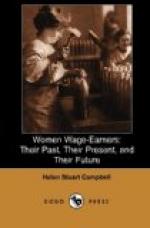“We believe that the payment and condition of those who work (through their employers) for us is our affair, and we have no right to remain in an ignorance that involves or may involve their misery. We believe we have no right, having obtained such knowledge, to refrain from seeking to remedy it, and urging all to assist us to do so.
“In this belief
we call your attention to the proposed ‘Consumers’
League,’ the members
of which shall pledge themselves to deal at
those stores where just
conditions exist.
“We have gotten together a number of facts which we shall be glad to present to you with our estimate of a fair house, or one which under existing conditions is eligible to admission to a white list.”
Preceding this appeal and the public meetings which ensued, came, in 1890, the formation of the Consumers’ League, Mrs. Josephine Shaw Lowell its President. Quiet and inconspicuous as its work has been, the best retail mercantile houses in New York have accepted its prospectus as just, and stand now upon the “White List,” which numbers all merchants who seek to deal justly and fairly with their employees. “What constitutes a Fair House” expresses all the needs and formulates the most vital demands of the working-woman; and the results already accomplished speak for themselves. As a guide to other workers, it is given here in full:—
STANDARD OF A FAIR HOUSE.
+Wages.+
A fair house is one in which equal pay is given for work of equal value, irrespective of sex. In the departments where women only are employed, in which the minimum wages are six dollars per week for experienced adult workers, and fall in few instances below eight dollars.
In which wages are paid by the week.
In which fines, if imposed,
are paid into a fund for the benefit of
the employees.




